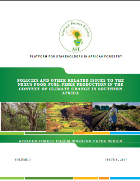The global advancement and investments in biofuels production, consumption and trade are widely regarded as offering environmentally-sustainable solutions to reducing harmful greenhouse gases (GHG), poverty reduction, food and energy security, rural development and employment in developing countries. However, biofuels may also lead to food insecurity, environmental degradation, loss of biodiversity habitat, human displacement; land use and land cover change in situations where policy and institutional frameworks are poor. It is against this background that the AFF instituted this study to investigate and understand the biofuels industry in the selected countries of southern Africa namely: Madagascar, Malawi, Zambia and Zimbabwe, its interplay within the nexus food-fuel-fibre (3Fs), as influenced by the existing policy and institutional frameworks. Specifically, this study sought to address the following key result areas:

